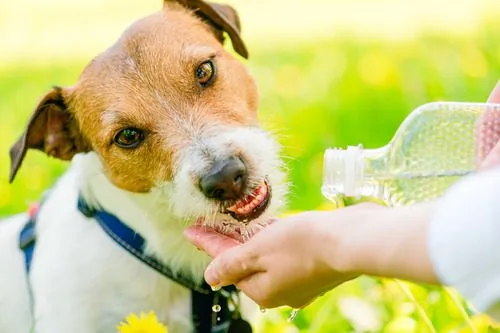What To Know About Dog Dehydration: Causes, Symptoms, Treatment and Prevention
Imagine it’s a sweltering summer afternoon, and your dog has been chasing a ball in the backyard for hours. Suddenly, you notice they seem sluggish, their tongue hanging out as they pant heavily. It’s easy to assume they’re just tired from play, but these could be early signs of dehydration. Dogs, like humans, rely on proper hydration to stay healthy and active, but their need for water might go unnoticed until it’s too late. At Riverstone Animal Hospital, we’re here to help you understand how to recognize and address dehydration before it impacts your dog’s health. If you’re concerned about your dog’s hydration, call us at (770) 479-7141 or book an appointment online today!

What Causes Dog Dehydration?
Dehydration in dogs occurs when their body loses more fluids than it takes in. Water is vital for your dog’s bodily functions, including temperature regulation, digestion, and joint lubrication. Several factors can lead to dehydration, including environmental, dietary, and health-related causes.
- Excessive Heat Exposure: Hot weather or overexertion during exercise can lead to dehydration, especially if your dog doesn’t have access to fresh water.
- Vomiting and Diarrhea: Conditions that cause fluid loss, such as gastrointestinal illnesses, can rapidly dehydrate your pet.
- Kidney Disease: Chronic health conditions like kidney disease may impair your dog’s ability to conserve water.
- Lack of Water Intake: Dogs that don’t drink enough water due to stress, illness, or environmental factors are at risk of dehydration.
- Illness or Fever: Sickness can cause your dog’s body to lose fluids faster than normal.
- Medication Side Effects: Some medications may increase urination or reduce your pet’s desire to drink water.
Symptoms of Dog Dehydration
While some symptoms are subtle, others are more apparent. Knowing what to watch for can help you act quickly.
Early Signs of Dog Dehydration
- Lethargy
- Dry Nose and Gums
- Dull or Sunken Eyes
- Loss of Skin Elasticity
- Decreased Appetite
- Panting
Severe Symptoms Requiring Immediate Veterinary Attention
- Weakness or Collapse
- Rapid Heartbeat
- Dark Urine or No Urination
If your dog shows any severe symptoms, contact Riverstone Animal Hospital immediately at (770) 479-7141.
How Dog Dehydration is Treated
Once dehydration is diagnosed, treatment depends on the severity of the condition. Your veterinarian will evaluate your dog and determine the most effective course of action. Severe dehydration often requires IV fluids to rehydrate your dog and restore electrolyte balance quickly. For milder cases, fluids may be administered under the skin to hydrate your dog gradually. Your vet may prescribe medications to address underlying causes, such as vomiting or diarrhea. If dehydration is linked to an underlying illness, hospitalization may be necessary for intensive care and monitoring. Always rely on a professional to determine the appropriate treatment.
Tips for Preventing Dog Dehydration
By adopting simple habits and practices, you can reduce the likelihood of dehydration and promote your dog’s overall health.
- Ensure your dog has constant access to clean, cool water, especially during hot weather or exercise.
- Keep an eye on how much your dog drinks each day to detect any changes in their hydration habits.
- Increase your dog’s water availability during hot weather, travel, or physical activity.
- Incorporate water-rich foods like wet dog food or hydrating snacks, particularly if your dog is a picky drinker.
- Many dogs prefer running water, and a pet fountain can encourage them to drink more frequently.
Consistency and awareness are key to preventing dehydration. Even small changes in routine can significantly improve your dog’s hydration levels.
When Is It Necessary to Contact Your Veterinarian?
Although mild dehydration can sometimes be resolved with additional fluids at home, any signs of persistent or severe dehydration warrant professional evaluation. Your veterinarian can identify the root cause of the dehydration and recommend an appropriate treatment plan. At Riverstone Animal Hospital, our team is here to support your dog’s health and hydration needs. Call us today at (770) 479-7141 or book an appointment online to address any concerns you have about your dog’s well-being.
